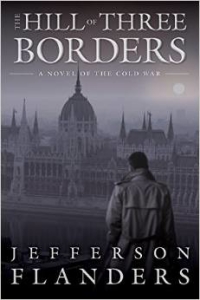Title: The Hill of Three Borders
Author: Jefferson Flanders
Publisher: Munroe Hill Press
ISBN: 0-9887840-0-9
ISBN-13: 978-0-9887840-0-0
Pages: 309
Genre: Historical Fiction/Literature
Reviewed by: Carol Davala, Pacific Book Review
Book Review
In this final installment of The First Trumpet trilogy, acclaimed journalist, educator, and author Jefferson Flanders, who has artfully taken readers to “Herald Square” and “The North Building”, now delivers his audience to “The Hill of Three Borders”. It is a triumphant addition to his well-crafted series of historic fiction novels that showcase the early years of the Cold War, and the consequential struggles between Soviets and the West.
Here Flanders presents an intricate and engaging storyline, told primarily from the point of view of Western journalists. The work unfolds as a dramatic and imaginative history lesson set behind the Iron Curtain. Amidst the vintage backdrop of the unexpected 1956 Budapest uprising, we encounter Morris Rose, aka Maxim Rusakov, a State Department official who defected to the Eastern Bloc, taking on the identity of a KGB colonel. Now in his desire to return to the US, he is offering an exchange of information about Russian spy infiltration, and classified details about the Soviet missile program. Drawn to the character of Everett Hale’s “The Man Without a Country”, Rose knows he will have to start life anew. This time around it will be with his Hungarian love, Eva. Her asylum in the US is just one demand of the exchange. With a sodium cyanide tablet close at hand, Rose vows never to risk interrogation. His other key stipulation for transfer out of the country, includes the assistance of his oldest friend, New York newsman, Dennis Collins. Troubled by a dark and stormy past with Rose, a reluctant Collins is pressured into the assignment. With the help of British counterintelligence officer Feliks Hawes, under guise as a freelance photographer, the two navigate difficult and questionable terrain in their efforts to extract Rose. In their dealings with a vast array of journalists, diplomats, government officials, and the AVO, within this grand framework of international espionage, political upheaval, secret meetings, and guarded checkpoints, Flanders smartly includes a character index to help readers stay on point. To this end, the stories Collins files with his editor, offer a moment of summary, focus, and perspective, for both the characters and readers in this twisting plot.
In fine detail, Flanders renders a genuine sense of time and place. Whether referencing the famous Horn & Hardart automat in Times Square, or the philosophy of American baseball, or in describing the atmosphere of the classic Duna Hotel or a shared bottle of palinka, a Hungarian apricot-flavored brandy, readers are immersed in culture and invested in the surroundings. As student protests become volatile, the ensuing revolt brings an added dimension to the narrative. Now the old world cityscape becomes a visual battlefield as the conflict between the Russians and insurgents fills the literary space with exploding tanks, armed teenagers, and molotov cocktails. The harsh reality of the situation brings new obstacles for the planned defection. Thematically this is a novel drenched in sensibilities of honor and betrayal, love and vindication. On the flip-side of patriotism, perhaps there is a glimpse of valor in doing wrong for all the right reasons.
There seems a quiet calm in the aftermath of the story’s action-packed intensity. The book’s final chapters purposefully bring us full circle, as we see Collins’ grown son has gone on to follow in his father’s footsteps. The wind-up of seeing a new generation witness barriers broken down and optimistic changes in the political climate, suggest an opportunity for further exploration of present day events, and the potential for a new series with the younger Collins’ resurrecting the integrity of his dad.
Amidst this well-conceived blend of arcing drama, romance, and espionage, Flanders proves himself the consummate writer. While “The Hill of Three Borders” stands firmly on its own, surely it will entice new readers to follow-up with the earlier works in this triad. Those already familiar will undoubtedly be looking forward to the author’s next historically-infused, creative literary endeavor.


